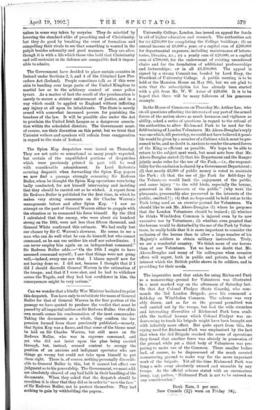In the House of Commons on Thursday Mr. Arthur Lee,
who on all questions affecting the interests of any part of the armed forces of the nation shows as much keenness and vigilance as ability, asked a series of questions in regard to the refusal of the authorities to allow Richmond Park to be used for the field training of London Volunteers. Mr. Akers-Douglas's reply was one which, till yesterday, we could not have believed it possi- ble would be given by a member of a Cabinet which must be pre- sumed to be, and no donbt is, anxious to render the armed forces of the King as efficient as possible. We hope to be able to return to the subject next week, but must note here that Mr. Akers-Douglas stated (1) that his Department and the Ranger jointly make rules for the use of the Park,—i.e., the responsi- bility for the exclusion is shared by a Government Department ; (2) that nearly £5,000 of public money is voted to maintain the Park ; (3) that the use of the Park for field-days by the Volunteers would limit the enjoyment of the public, and cause injury " to the wild birds, especially the herons, preserved in the interests of the public" [why were the pheasants, presumably also preserved in the interests of the public, omitted ?] ; (4) that no hope could be held out as to the Park being used as an exercise ground for Volunteers. We should like to ask Mr. Akers-Douglas (1) where he proposes that the London Volunteers should be trained ; (2) whether he thinks Wimbledon Common is injured even by its now excessive use by Volunteers ; (3) whether, even granted that the herons would be disturbed by the use of the Park by Volun- teers, he really holds that it is more important to consider the seclusion of the herons than to allow a large number of his Majesty's soldiers to obtain military instruction. Truly, we are a wonderful country. We think more of our herons than of our Volunteers. Yet we have no doubt that Mr. Akers-Douglas and many of his colleagues when occasion offers will regret, both in public and private, the lack of interest which the British public shows in its soldiers, and in providing for their needs.










































 Previous page
Previous page